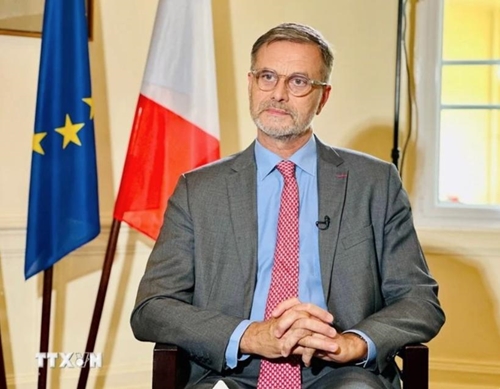Speaking to the media on the occasion of the Vietnamese PM’s visit to France to attend the conference, co-hosted by France and Costa Rica, and engage in a range of bilateral activities, the diplomat remarked that Vietnam’s presence and voice at the conference are particularly meaningful. He highlighted that the Southeast Asian nation, with a coastline stretching over 3,200 kilometers, faces challenges linked to the ocean, including climate change, coastal erosion, depletion of marine resources, and maritime disputes.
    |
 |
|
French Ambassador to Vietnam Olivier Brochet |
The ambassador noted that France had invited Vietnam to lead a side event focused on river deltas around the world, including the Mekong Delta. The conference in Nice, he said, presents a valuable opportunity for the two countries to affirm their shared values and viewpoints on the international stage, while working together to address global challenges.
He said on this occasion, France is particularly hopeful that the Vietnamese leader will announce the approval of the Agreement under the United Nations Convention on the Law of the Sea on the Conservation and Sustainable Use of Marine Biological Diversity of Areas beyond National Jurisdiction (BBNJ Agreement). France has already ratified the treaty and encourages Vietnam and other countries to do the same to facilitate its early entry into force.
France is keen to work closely with both E.U. and non-E.U. partners such as Vietnam to build a shared understanding of the threats facing the oceans, and to take timely, effective action before the situation becomes irreversible, the diplomat stated.
Regarding bilateral cooperation on sustainable marine resource exploitation, Brochet said Vietnam and France have long collaborated at the international level, particularly in advancing governance for the high seas, which currently lack comprehensive regulations.
He also highlighted the two countries’ long-standing scientific collaboration, especially in marine research. French institutions such as IRD, IFREMER, and CIRAD are working closely with Vietnamese partners on a range of projects. In addition, France is supporting Vietnam in addressing coastal erosion, with the French Development Agency AFD implementing projects across several Vietnamese provinces to tackle this issue.
France is also assisting Vietnam in meeting E.U. requirements to lift the 'yellow card' warning imposed on its fisheries sector. As part of French President Emmanuel Macron’s recent visit to Vietnam, France announced 700,000 EUR in funding for a pilot initiative using satellite-based monitoring devices on Vietnamese fishing vessels. If successful, the program could be extended across the entire fleet, thereby helping Vietnam meet E.U. standards.
Looking at broader cooperation, Brochet emphasized that higher education and research have remained pillars of the two countries’ partnership for over three decades. In light of Vietnam’s recently issued Resolution 57-NQ/TW, which calls for stronger development of science and higher education, France hopes to deepen collaboration in this area.
During President Macron’s visit, the French Tech Summit in Ho Chi Minh City officially launched the France–Vietnam year of innovation, which will run until the end of 2026. This initiative aims to foster connections among businesses, universities, and research institutions from both countries to jointly address development challenges.
Brochet said one key objective is to increase the number of Vietnamese students in France, which remains relatively modest. At the same time, efforts are needed to further promote Francophone culture in Vietnam. Beyond the hard sciences, bilateral research collaboration is expanding into areas such as healthcare, biomedicine, transport, nuclear energy, space technology, and applied sciences.
Finally, the ambassador stressed the importance of culture as a cornerstone of the bilateral ties. He noted that cultural exchange continues to enrich both nations and that culture and innovation will serve as vital foundations for future cooperation.
Source: VNA